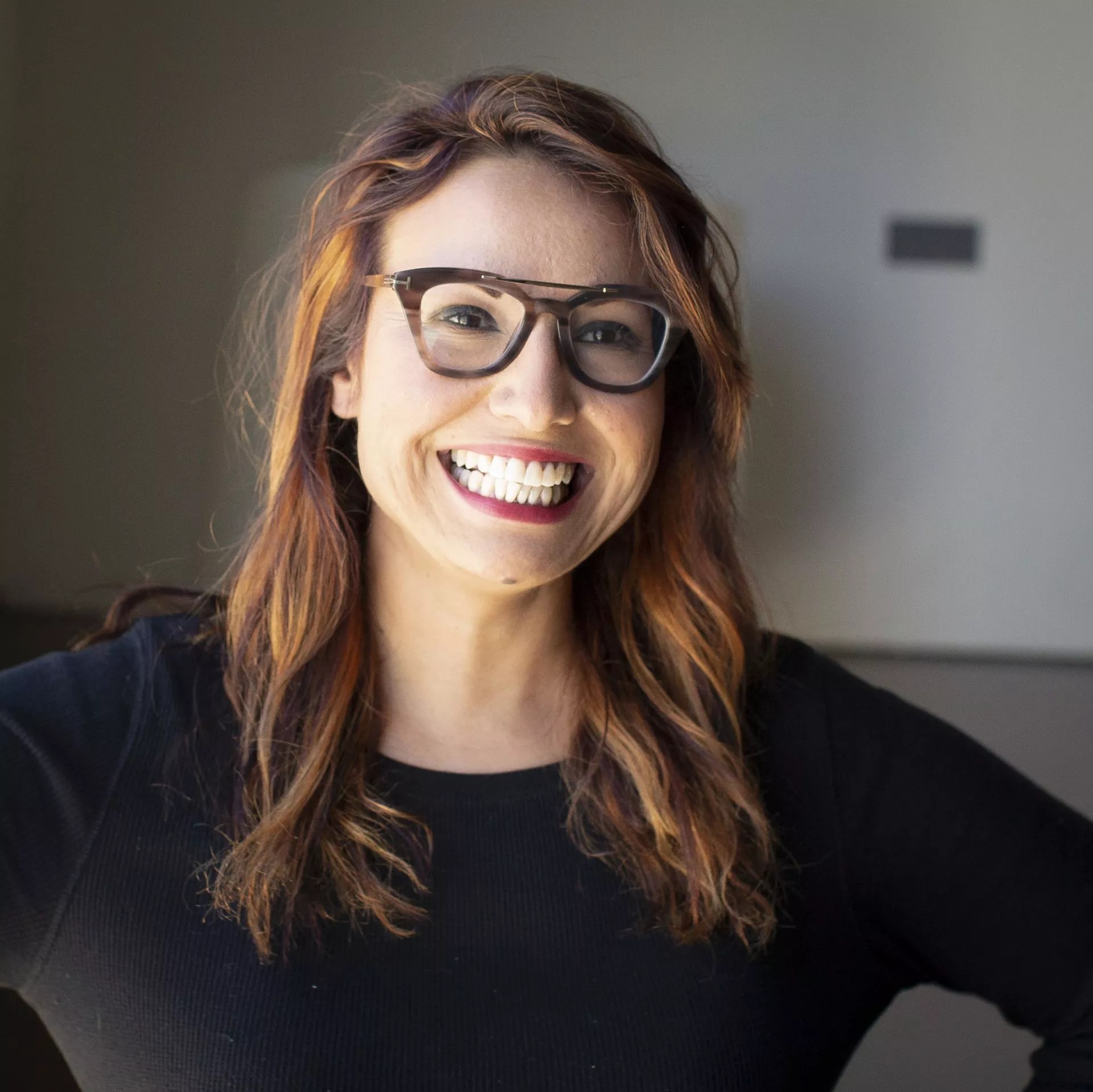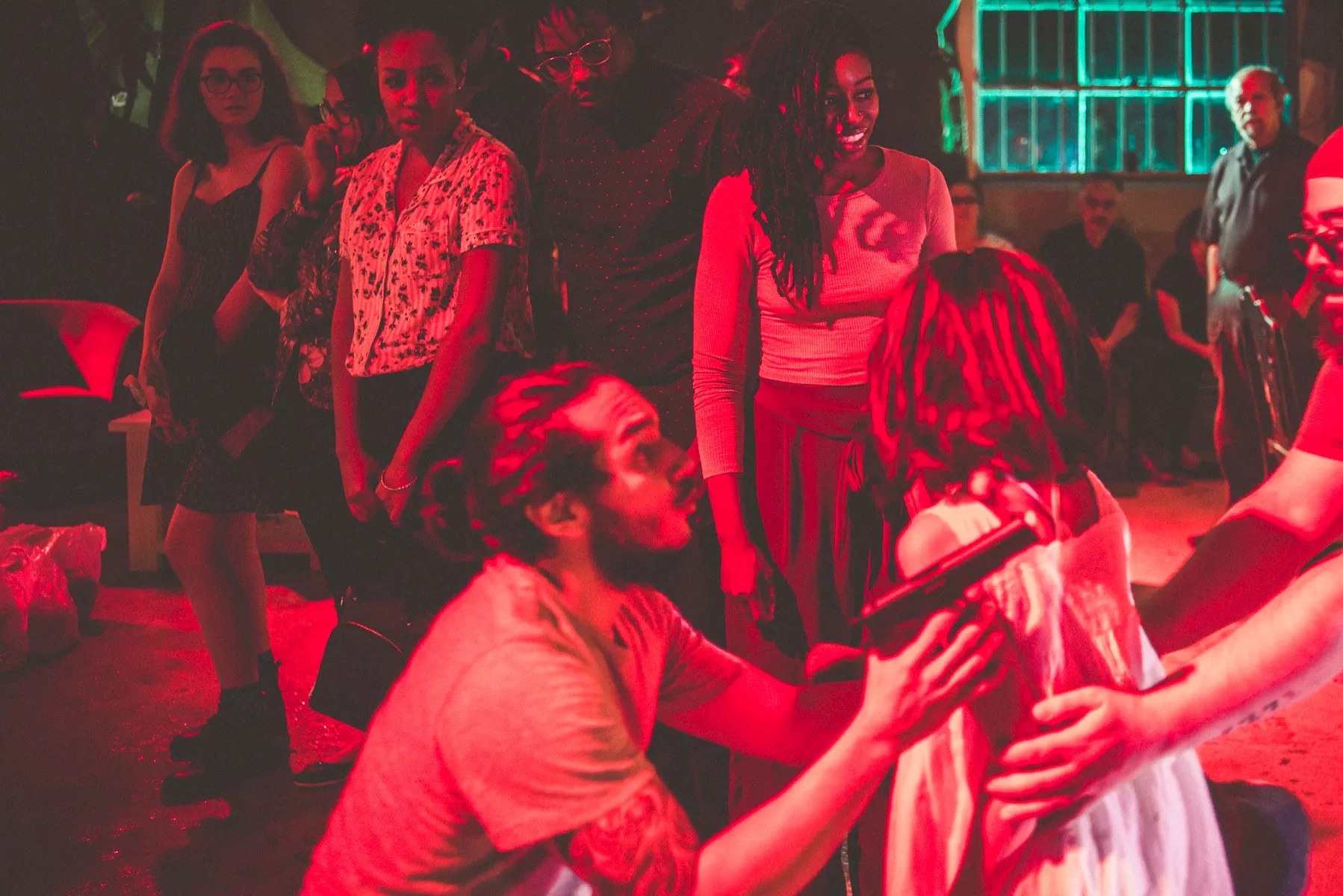
Johnny Rutledge

Audio By Carbonatix
Ilknur Ozgur has boundless energy. She talks quickly and effusively, often digressing into detailed, rambling stories that somehow, someway, make their way back to a larger point. When you ask her about any of her passions (art, performance or her performance art company, Artstillery, to name a few) she lights up, her dark brown eyes growing as wide as her round glasses.
Sometimes, she’ll reach out with one of her arms, both of which are emblazoned with tattoos, and rest her hand on your shoulder or your hand. It’s one of her ways of saying that she’s grateful for your presence. Simply put, Ilknur Ozgur possesses the ceaseless vigor of a major theater nerd.
She’ll be the first to tell you that she’s not a big fan of the “t” word. She used to work for a Puerto Rican theater company, is a former professor of performance art and theater, and is the co-founder of what many people would call a theater company, and the mere idea causes Ozgur to cringe.
“Theater is a dying art,” she says. “The fourth wall, and the passive art of watching something unfold, that’s not what I’m interested in.”
That’s why Ozgur, with friend Michael Cleveland and a band of artists, poets and performers, founded Artstillery, an experimental performance company based in West Dallas, which creates and performs original works based on stories lived by members of the company or its surrounding community. Their stories address gentrification, poverty, immigration, trauma and other social injustices. Each night’s performance is different, and there are no seasons. The script is a living document, often changed on the day of the performance. Research, rehearsal and preparations can last as long as the company wants.
As Cleveland says, “The show is ready when it’s ready. We let the process take as long as it takes.”
Armed with over nearly two decades of theater experience, Ozgur and company build a space inclusive of underprivileged unheard voices, and a space where audiences and artists alike can perform, engage and heal.
“We need to allow people to feel what they’re feeling,” she says. “We need them to be a part of these narratives.”

A scene from Artstillery’s experimental play, Dirty Turk.
Alyssa Eykilis
Ilknur Ozgur is the daughter of Turkish immigrants. Her father, a professional boxer and soccer player, migrated to the United States with a mere $100 and one piece of luggage.
“He came here to marry my mother, and he just started working,” Ozgur recalls. “Some of my earliest memories are my parents trying to learn English and studying for their citizenship exam.”
The group, including her younger brother, lived in a 1.5-bedroom condo in Chicago.
“I would look at the bigger houses down the street and tell myself, ‘You’re going to get there one day,'” she says. “‘You’re going do everything you can to be stable.'”
To Ozgur’s parents, stability meant a career as an engineer or dentist. But for her, a life of art and performance seemed like the only one worth living. Ozgur was drawn to the stage at an early age, even if theater as we know it pained her.
“I remember thinking, ‘Why are we doing these scripts over and over again throughout time? Hasn’t someone done this already? Where is the new work, the work I can hear my voice in?’
“For them, the arts was never anything that could manifest into a lifestyle,” Ozgur says. “Anytime it came up, all they would say was, ‘We just don’t want to see you suffer.'”
Bucking her parents’ wishes, Ozgur studied the arts at Harper College, a community college in Palatine, Illinois, before studying performance art at Roosevelt University and maintaining multiple jobs to put her through grad school at Northeastern Illinois University. By the time she finished her master’s in Performance Art, Ozgur’s resume included stints with the Blue Man Group and Warped Tour. Even so, she found it difficult to survive as an artist in Chicago and started looking for a change. Her job search led her to a teaching post at Tarrant County College.
“I never even considered going south,” she says. “But Texas picked me up.”
Two years at TCC couldn’t curb the growing sickening feeling reminding her that she wasn’t representing the voices she meant to give a stage to, so Ozgur made a fateful call to her friend, Michael Cleveland.
The artist has an obsessive devotion to Artstillery, which occupies her nights, weekends, and nearly all her creative energy. In addition, she has a day job.
The collective found its roots at Ozgur’s apartment, a Dallas locale that became a haven for artists of all kinds. The Chicago transplant was recently divorced and living on her own, and she couldn’t seem to shake this growing cadre of performers, poets and misfits mingling at her space. That group included Cleveland, who Ozgur knew through work with another experimental theater company.
“I remember thinking, ‘Where is the new work, the work I can hear my voice in?’” — Ilknur Ozgur
“Ilknur called me and said, ‘I want to produce work that matters to people,'” Cleveland recalls. “We got together over coffee and started talking about all these stories we wanted to tell.”
From its inception, Artstillery has tried to be timely.
“It needs to be culturally relevant,” Ozgur says. “It needed to be something people can see their voice in.”
Artstillery’s first project was Family Dollar, a performance workshop that took place in a decrepit West Dallas neighborhood in the process of being gentrified. The company sought out a series of dilapidated shotgun houses that still contained photos and journals documenting generations of struggle.
“Right there, in those pages, was a story of institutional poverty,” Cleveland says. “We knew we had to tell this story, and we had to tell it in the houses.”
Those houses, too unsafe for pedestrians to enter, became the company’s first set. Ozgur, Cleveland and their growing company broke down the windows and rid the structures and their surrounding streets of countless hypodermic needles. They had their stage, now they needed their lead. Enter Concetta Troskie, a counselor well-versed in movement and arts therapy. Troskie met Ozgur when she attended a writing workshop for Family Dollar in 2016.
“I was sitting there when in walks this woman with blue hair and big dogs,” Troskie says. “People started to perk up and take notice, and I’m there thinking, ‘OK, this person and I have to be friends.'”
Troskie immediately impressed Ozgur, who asked her to be the lead in the company’s first production. For three nights, the company performed a show inside the last vestiges of this poverty-ridden community while their audience lingered outside.
“People would be driving by and they’d stop to watch what’s going on,” Ozgur says, “and we’d say, ‘Everything we do is real.'”
The script for Family Dollar, like all of the company’s future scripts, was a Google doc that gave everyone the permission to edit. A couple of weeks before the (in this case) metaphorical curtain, the performers etch the script on a giant scroll, mark it up and assess what does not work.
In an effort to give the actors excess freedom, scenes are described, but without scripted dialogue. The company may come together after a performance to scrap or replace a whole scene. One of the few signs of structure lies with the characters, with rules that dictate where they can move and to whom they can talk. Beyond that, the actors are free to perform how they see fit each night.
“Many of us have worked with other theater companies, and we want to try something new,” Cleveland says.
The company includes stage newcomers and other types of artists. One of them, a 14-year-old aspiring poet named Sirjerold Martin, showed up to the writing labs Ozgur hosts each Saturday. Ozgur gave him a contract to sign promising he’d keep his grades up.
When asked to share how Artstillery has helped him, Martin wrote a page of notes. It begins, “I took a chance on something, and that something was Artstillery. It’s given me a sense of strength, friendship, courage and pride.”
Artstillery has few rules, but one of them is, “If you ask us to audition, we’ll yell at you.”
“Instead, ask us how you can get involved,” Cleveland says.
The company followed up by performing Dirty Turk at a property they now own on Fort Worth Avenue. The immigration-focused production was an immersive performance that included live music, video installations and large puppets, and performances that spilled onto the streets outside the venue.
When new immigration laws went into effect, Artstillery organized “Welcome Mat,” a one-day program that invited different churches and people from varying faiths to Nasher Hall for a group meditation and prayer. The company has also started hosting monthly art cultivation events, a variety show-like experience where various artists are invited to share their work. With Troskie on board, Artstillery has started offering movement therapy workshops to community organizations, employing some of the techniques Troskie brings to rehearsals with her fellow actors.
Ozgur calls it a team effort, and with so many moving parts, that’s an understatement. Artstillery strives for complete equity from its members. If you want to act, you’re also going to do lights. If you write, prepare to help with setup and tear-down, too. Even so, Ozgur assumes the role of leader when she has to, which Cleveland and Troskie have no problem with.
These two artists employ every adjective and idiom they can think of when describing Ozgur. “Ilknur is a beam of light.” “Ilknur is a ray of sunshine.” “Ilknur is a pillar of strength.”
Ozgur demures, and the praise brings her to tears.
“I’m just grateful,” she’ll say, before dashing off on the next topic.
Every one of these artists gets paid for their contributions to Artstillery, even if Ozgur has to use her own money to do so. When speaking on the time and energy she pumps into the company, the otherwise verbose Ozgur laughs and offers a terse response.
“This is who I am,” she says. “I can’t live my life any other way.”